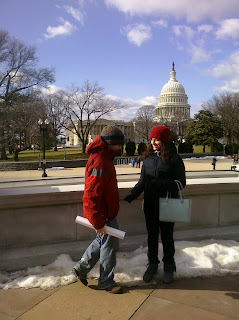I thought a lot about what to write this final post about, and eventually decided to basically respond to the post I wrote before I started reading.
In my first post, I quoted a Wisconsin State Journal article:
"Spark wanted to ruminate on how the United States seemed to be going after a false enemy in Iraq, and also how Jews are often perceived as much as victims as they are aggressors in Palestine. The idea of the good and the bad guys being hidden from view, living among the rest of society, intrigued her."
After reading this article, I was most interested in finding out how Spark portrayed the Israeli/Palestinian conflict.
I was pleasantly surprised to find that her commentary was almost entirely metaphorical. Though the book occasionally referred to the Middle East, Spark let the characters represent conflict rather than squeezing her own political rantings between dialogue tags.
Instead of forcing one opinion over the other, the book lays out the facts and lets the readers decide for themselves how they want to feel about the conflict between the characters, which I took as a representation for the Israeli/Palestinian conflict.
On the side of the Israelis you have Ellen (Esther) and her cousin Mose (Mordechai). I don't think Spark intended for Ellen to be unlikable, or come off as stupid, but I had a hard time rooting for her character. Though she is sweet and well-intentioned, she makes stupid decisions based on convenience and refuses to think about anything outside of her day-to-day life. She prefers her simple yet satisfied mindset. While her cousin Mose is a strong supporter of Israel, Ellen refuses to take sides.
Mose, on the other hand, would be very difficult to dislike. A smart and sassy old Jewish man, Mose knows everything and never fails to disseminate his never faulty knowledge to those around him.
He's a beloved teacher at a Madison high school that encourages teachers to think and teach creatively. When Hyman Clark takes over as principal, the two of them immediately clash and Mose is convinced Hyman is out to get him.
Mose's outrage at Hyman, who represents the Palestinians, seems paranoid at first. He takes unreturned e-mails, disapproval of his teaching style and more small details to mean anti-Semitism. You think, so you don't like your boss. That sucks. Not the end of the world.
But **Spoiler Alert** as time goes on, Hyman's actions worsen, until it becomes clear that his rage is targeted at Mose because he's a Jew. In the end, we find out Hyman was a former white supremacist in the south.
The story ends with Mose as the good guy and Hyman as the bad guy. Israel is the victim and the Palestinians are the aggressors. But woven in between Hyman's demonstrations of anti-Semitism and his disturbing past is his failing marriage and weakness of character. We find out he was once an accountant who lost his business to refugees simply because they were refugees. He was justifiably angry about his circumstances when he joined a club that promised they could do something about it.
Hyman is not a smart man, and didn't understand he was joining a white supremacist party. He thought he was just fighting for what was rightfully his. Of course, by the time he realized this he was already brainwashed with propaganda and a full-fledged Neo-Nazi.
Spark leaves it up to you if you want to feel sorry for Hyman. You certainly wouldn't take his side, but there's an element of tragedy in his story. He's lonely, vying for the love of his wife who seems to hate him, and doesn't understand why an honest worker suddenly lost a portion of his business. It's ignorance that makes him evil, not malice.
But, evil is evil and though you start to feel sorry for him, you recognize that this is not someone you would root for.
Of course, the Israeli/Palestinian conflict is much more complicated. I don't think Palestinians are evil. I think some Palestinians are evil (suicide bombers) and the rest just want to survive. There is certainly an element of tragedy to their story, and I do feel sorry for the innocent.



